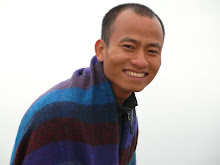9 November 2010 :: J.E. Robertson
Burmese Election Denounced as Rife with Fraud, Intimidation
Posted by
arakankovida
Tuesday, November 9, 2010
The Burmese ruling military junta, which officially corrected the English translation toMyanmar —a more traditional pronunciation— after it seized power, has staged the first democratic elections in two decades, and observers both inside and outside the country are saying the vote process was rigged to favor pro-junta politicians. The military also retains no less than 25% of all seats in the new parliament, which will double as an electoral college to choose the president.
The party of Nobel laureate and chief opposition leader Aung San Suu Kyi, who has been under house arrest for most of the twenty years since she won a landslide victory in the 1990 presidential vote, has been barred from participating. The party called for a nationwide civilian boycott of the vote, to demonstrate the illegitimacy of the process.
Still, preliminary reports suggest turnout may have been as high as 60%. Most outside observers say turnout is a symbolic issue, given the numerous ways in which it is alleged the military government rigged the vote to bar dissidents or opponents from winning office. But the Christian Science Monitor reports that some pragmatists say this is a meaningful first step and could open the way to more pluralistic and adversarial politics.
International election monitors have been banned, journalists have been forbidden from entering the country to report on the polling process, and opposition leaders have been detained or refused release. Aung San Suu Kyi, the most visible and respected pro-democracy activist in the country, remains under military guard under “temporary” house arrest, which the junta says is for her safety.
Most international observers believe that since she has effectively been denied the presidency since 1990, by use of military force, there could be no legitimate vote without her active political involvement in the campaign. The generals, however, have another vision, which seems to be to fashion a semi-democratic process through which pro-military parties with differing views on issues of policy compete for public backing.
The idea of a “Fidel Castro lite” type of constitutional democracy has gained ground as a way of analyzing the peculiarities of the process. Castro has forbidden any party other than his Communist Party of Cuba to compete in national elections, since taking power in 1959, but still claims elections are democratic. By comparison, Iran’s hardline clerical regime has permitted opposition victories and at least one period of serious reformist government.
The Burmese junta, however, appears to be determined to prevent any such opposition figures from coming to power. In effect, they would need only 25% (plus one) of the new parliamentary ministers to support their candidate, as they retain fully 25% of the electoral college vote. Most casual observers and comment from the street seem to suggest that while many will vote their conscience, many who participate may view this first election as a great step forward, but a formality, and be afraid to vote against the junta.
With allegations of ballot-box-stuffing and widespread voter intimidation, including unconfirmed reports of physical violence against opposition volunteers and party supporters, it appears the outcome of the vote will be widely considered illegitimate. It now looks, however, like the Union Solidarity and Development Party (USDP), which is supported by the ruling junta, will take 80% of the seats in the new parliament, which means it will have earned the support of voters for 73% of the vote-determined seats.
The BBC is reporting that the election has spurred regional hopes that Burma will now be able to emerge from a long night of dictatorial regression:
Chinese papers strongly urge Burma and the rest of the region to ignore the West’s condemnation and press on with their own methods of political change.
A Thai paper says that the Association of Southeast Asian Nations (Asean) will have no choice but to endorse the results as Burma’s inclusion in the group helps support its high economic growth.
The same report says India has tentatively expressed the view that this first step toward electoral democracy could “open the floodgates” and lead to a pro-democratic progress that could not be rolled back by the military. The National Unity Party (NUP), associated with supporters of the former military dictator Ne Win, who ruled from 1962 through 1988, won the second most votes.
UN Secretary General Ban Ki-moon said the vote was “insufficiently inclusive, participatory and transparent“, and demanded that Aung San Suu Kyi and other political prisoners be released “without delay”. The clear reaction of the world’s top diplomat was that this election could not be considered legitimate with so many obstacles to participation and so many people held prisoner simply to prevent their playing a role in the campaign.
The question will now have to be: will the Myanma (Burmese) people find a more solid footing in the sphere of parliamentary politics, and carry out the substance of the reforms the opposition has so long sought, or will the military junta continue to exercise its extreme control of the political sphere, despite voters having officially chosen civilian leaders whose authority should supersede that of the generals?
There is also some question as to whether the programming of a bloc of 25% of parliamentary seats for representatives of the military is a legal ploy to allow top officials responsible for serious crimes to avoid prosecution, following a strategy like that tried by Chilean former dictator General Augusto Pinochet, who declared himself senator for life, retaining immunity for the brutal crimes he was alleged to have ordered on behalf of his regime.














0 comments